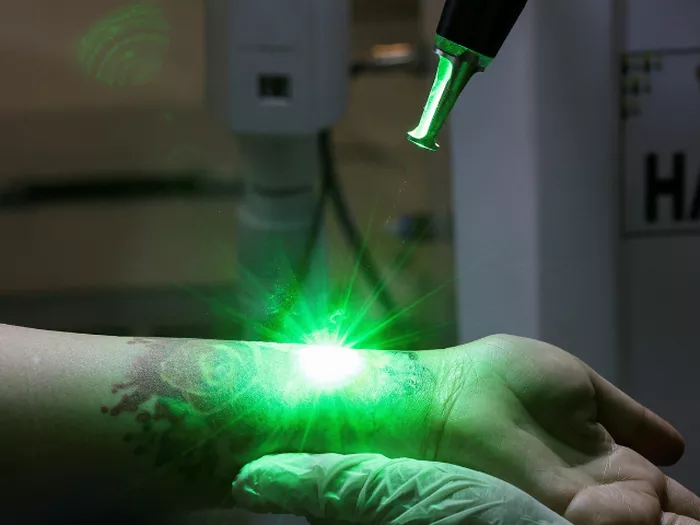In Indonesia’s capital, Jakarta, an increasing number of people are turning to a free tattoo removal service provided by the Amil Zakat National Agency, a prominent Islamic charity, to “repent” during the holy month of Ramadan.
This service is specifically aimed at helping practicing Muslims who wish to remove tattoos, which some view as conflicting with their religious beliefs.
Teguh Islean Septura, a 30-year-old former musician, is one of the many individuals seeking to erase tattoos as part of his spiritual journey. In his younger years, he adorned his body with tattoos to appear “cool” while performing in a band. However, Septura now deeply regrets those decisions.
“God gave me clean skin, and I ruined it. That’s what I regret now,” he reflected as the laser worked on his tattoos. He believes that Muslims should not alter the body given by God and is determined to improve himself and grow closer to God during Ramadan.
First launched in 2019, the tattoo removal initiative is now held annually during Ramadan. This year, over 700 people have signed up for the free service, and nearly 3,000 individuals have benefitted since its inception.
Mohammad Asep Wahyudi, the coordinator for the event, explained that the program serves as an opportunity for individuals to “move closer to God” and seek repentance by removing tattoos.
For many participants, the high cost of professional tattoo removal, which can run into thousands of dollars for large, detailed tattoos, makes the service invaluable.
Tattooing remains a controversial practice in some Asian cultures, including in Muslim-majority Indonesia. Beyond religious concerns, tattoos in Indonesia are sometimes linked with criminality and gangs, and in some instances, women with tattoos are stigmatized as promiscuous or disreputable.
This stigma has prompted some individuals, especially women, to pursue tattoo removal to improve their social standing and strengthen familial relationships.
Sri Indrayati, 52, regretted the tattoo she got after the birth of her first daughter. Over time, she became self-conscious about it, especially when her grandchildren would comment on it. “When I take my grandson to school, the children whisper: ‘Look at that grandma, she has a tattoo!’” she shared.
Similarly, Evalia Zadora, 36, got a tattoo as a teenager to gain acceptance into a gang. She now wishes to remove it out of respect for her husband and son, who feel uncomfortable with it. “It affected my husband and son,” Zadora admitted. “I respect their feelings, so I want to remove it.”
The tattoo removal program, held annually during Ramadan, is part of the broader efforts by the Amil Zakat National Agency to help Muslims reflect on their actions, engage in religious practices, and perform good deeds during the holy month.
As the initiative continues to grow, it is helping more people shed the symbols of their past and embark on a path of renewed faith and self-improvement.
Related Topics

